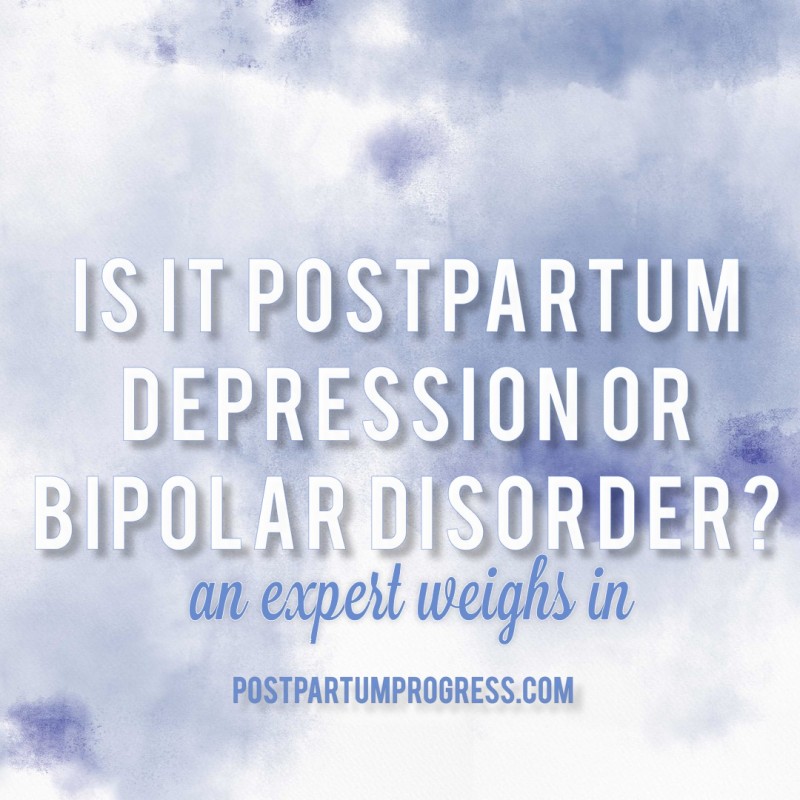While in a manic state a person can feel very good. Therefore about half of women with bipolar disorder stay well after having a baby and about half may have an episode of illness.
 Postpartum Depression The Recovery Village Drug And Alcohol Rehab
Postpartum Depression The Recovery Village Drug And Alcohol Rehab
Bipolar disorder in the postnatal period Bipolar disorder which used to be called manic depression is a serious mental health condition that affects between one to three percent of women.

Can postpartum depression cause bipolar disorder. Does postpartum depression lead to bipolar disorder. Other readers who have been treated for a year or more for postpartum depression but feel the treatment isnt working have also inquired whether it may be that they were misdiagnosed with PPD and could actually have bipolar disorder. Bipolar disorder can look like a severe depression or anxiety.
For example there is the issue of missed identification of emerging episodes. Those who have struggled with mood disorders like depression or anxiety or more significant mental illnesses like bipolar disorder are 30 to 35 more likely to face postpartum depression in their lifetime. The study found that the occurrence of conversion from depression to bipolar disorder in postpartum women was 11-18 times higher than reported in non-postpartum women.
It might seem unimportant to publicize an obscure mood disorder but every moms postpartum experience counts. Postpartum bipolar is also known as bipolar peripartum onset and its arguably the least known of the six postpartum mood and anxiety disorders. 54 with of women diagnosed with postpartum depression had bipolar disorder not.
Poor social support young age traumatic delivery and financial instability are other potential causative factors. Starting with either mania or depression women with postpartum bipolar disorder can experience severe up-swings that include feelings of euphoria grandiose self-image high irritability and. In the postpartum period bipolar PPD is common can be differentiated from unipolar PPD and needs to be identified promptly in order to expedite appropriate treatment.
Women with one or more family members who have suffered from postpartum depression have a greater risk of developing it as well. Bipolar disorder is a mental disorder in which a person experiences alternating periods of depression with symptoms similar to unipolar depression and periods of mania. Studies have found that women with bipolar disorder are more likely to have postpartum depression than either healthy women or women with major.
If you have a history of postpartum depression or postpartum psychosis or a personal or family history of bipolar illness you may be more at risk for developing symptoms of bipolar disorder in the postpartum period. Compare that to postpartum depression which typically has a longer onset period of zero to five months after delivery. Those who have had a previous severe postpartum illness.
Treatment of bipolar disorder with antidepressants can trigger manic symptoms. The high moods of postpartum bipolar disorder can manifest as either mania or hypomania. Not had previous psychiatric illness.
Many individuals think of postpartum depression as an episode of major depressive disorder within 4 weeks of delivery. No but you might mistakenly think that if you read some of the headlines this week. Two groups of women with bipolar disorder are at even higher risk.
In pregnant and postpartum women a bipolar depression can look just like a very severe depression or might be experienced as anxiety. Periods of mania are defined by elevated mood and high energy. By contrast with the acute nature of psychosis onset depressive symptoms typically develop more gradually and can be misattributed to anxiety adjustment or hormonal factors.
However postpartum depressive symptoms also can occur in the context of bipolar I disorder BD I or bipolar II disorder BD II. Many medical professionals are unaware that postpartum bipolar exists. Many researchers conclude that postpartum psychosis is considered to be on the bipolar spectrum and a prior history of depression andor anxiety is a strong risk factor.
If you look at the. Postnatal depression follows a further 25 of births. It is very important that your mood history is reviewed to assess whether you have had times of a persistently elevated mood decreased need for sleep and periods of over-average productivity.
Depressive episodes in the context of bipolar disorder pose unique treatment challenges. Future studies on pharmacotherapy and psychotherapy should focus on the acute and preventative treatment of bipolar PPD. Lots of media outlets reported that severe postpartum mental illness including postpartum depression is linked to later development of bipolar disorder.
Mania is very severe symptoms that cause functional impairment explains Dr. A small segment of my readers who were initially diagnosed with postpartum depression have learned down the road that they have bipolar disorder.
